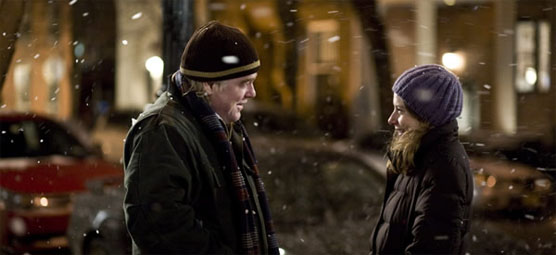Good actors don’t need great movies to churn out performances worth seeing. Great directors can take a weak story and turn it into something more. Great scripts can hardly survive the hands of an incompetent cast or director. Philip Seymour Hoffman’s directorial debut, Jack Goes Boating, is somehow none of these things and all them: a film that features inconsistent performances, multiple dull sequences, and a script that at times feels forced, but at others, sublimely inspired. Hoffman also stars in the picture, and the thing that Jack Goes Boating has going for it is that it hits its best notes in its last twenty minutes. You to leave theater with the impression that you have seen a romantic fable that manages to articulate something moving about the sacrifices real lovers are driven to make for each other – an assertion that feels both slight and true.
Hoffman plays Jack, a docile New York City limousine driver with a taste for ska music. He wears a suit and a wool hat, which hides the beginnings of dreadlocks in his shaggy blond hair. He lives in his uncle’s basement and is a bachelor so accustomed to solitude he no longer seems to notice his loneliness. Jack’s only friends are Clyde (John Ortiz), a jumpy and jovial Hispanic limo driver, and his wife Lucy (Daphne Rubin-Vega). Very early in the film a fourth as added to this trio (or duo with a third wheel), Connie (Amy Ryan), a coworker from Lucy’s mortuary services sales office, who is middle-aged, single, nervous, and shy. The romantic tension in the misfit love story that unfolds is not whether or not Connie and Jack will attract each other. Instead, we wonder if these potential lovers’ social shortcomings will self-destruct the budding relationship (as you can infer they must have many times in the past). The catalyst for the relationship’s success comes when Connie is attacked on the subway, landing her in the hospital. It is a vulnerable, real life incident that allows Jack and Connie to skip over most of the awkwardness of early dating shenanigans and allow them to jump straight to the part where they know they care for each other.
And that is what distinguishes the two oddball lovers: they actually care for each other. Robert Glaudini, who wrote both the screenplay and the original stage play, creates a simple juxtaposition between Jack and Connie, and Clyde and Lucy: the former are pure-hearted lovers who desire to be better for – and because of – each other. The married relationship falls apart because of infidelity, suspicion, personal anxiety, and selfishness. This straight setup comes across somewhat bluntly, and it is a little too obvious in the film. As Jack goes through the motions of bettering himself for Connie – learning how to swim so they can go boating in the summer and learning how to cook because Connie tells him no one has ever cooked for her before – the little love story begins to feel trite and sentimental, and we loose interest. But Hoffman manages to pull it together in the end, ramping up the performances – both his own and the ensemble – and pulling off a dizzying final scene that leaves you a little heartbroken for these silly characters, just as Jack’s heart finally matures into adult wholeness.
Photo courtesy of Overture Films





